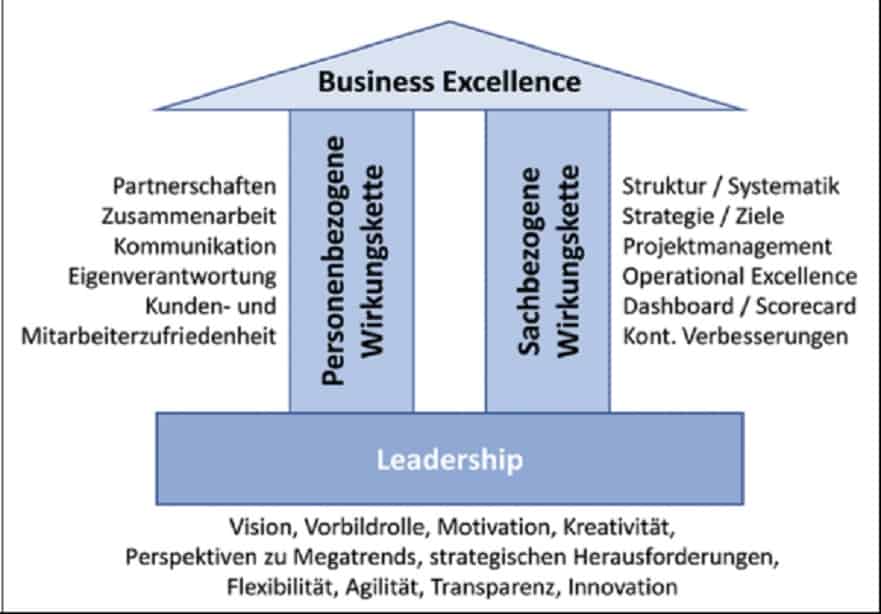Excellence is not a question of size
Whether a company is successful or not is by no means a matter of chance. The following article gives some simple approaches for a journey towards excellence. They are insights from top organizations that have won the EFQM Global Excellence Award.

For many organizations, "business excellence" is something abstract. They know that excellent organizations are significantly more successful. But they don't know how to learn from the best. To put it bluntly: Everyone can rise that high; regardless of industry or size. You just have to do what you do anyway more consciously, systematically and effectively. Excel-lence is a matter of "spirit" and not "money". Below I present some simple recipes for success to get you started.
Vision
"We are a model city in Europe" (city administration). "We are shaping the transformation in healthcare" (hospital/hospital). "Flexibility, agility and efficiency lead us to excellence" (manufacturing). "We inspire people and improve their quality of life" (engineering). That's what visions of top organizations sound like. And they all have one; you can't do without one. Before you begin the journey to excellence, set yourself a vision as well. This requires some imagination and an inner fire for its implementation, nothing more. Actually, a weekend on a walk is enough for this. Formulate the vision with a simple sentence that everyone understands. Make it general and yet as concrete as possible so that all employees feel addressed. Of course, a long-term challenge should be recognizable in the vision. And it can be a little crazy, can't it? In any case, the corporate culture and management should be fully aligned with the vision so that it does not degenerate into a cheap slogan.
Leadership
"Inspire, motivate, inspire, give perspectives". These are the characteristics of a "leader" who carries others along on the path to Excel-lence. Leadership means doing everything in your power to become "best-in-class". Leadership is the most important success factor of top organizations. Leaders exude a spirit of excellence. This includes both masculine aspects (numbers, results, structures) and feminine aspects (people, relationships, communication). Leaders are not only managers ("team leaders"), but also experts who drive the organisation forward in a specialist way (e.g. on the subject of digitalisation). Leadership means teamwork and is not a one-person show of the boss. In top organizations, there is practically no power imbalance. Leaders are therefore clearly different from managers. The latter are hierarchical, results-oriented: Project completion, year-end closing, bonus ... Of course, managers who implement concrete things are needed. But you will hardly reach a level of excellence with managers without leaders.
Partnerships
"1 +1 = 3." An essential element of peak organizations is the openness to enter into partnerships. Each party has its strengths and idiosyncrasies - much like in a private partnership. And the sum is more than twice the individual. Partnerships can be entered into with important suppliers, customers, universities, technology companies, etc. They are always long-term and mutually beneficial. They are always long-term oriented for mutual benefit. It is never a matter of simply getting better conditions, but of achieving common goals. Only strategic success counts. Partners are involved in the strategy formulation process and can thus contribute their voice directly. Trust and transparency are key to their success. With partnerships, organizational boundaries become blurred. So a partnership is much more than a close supplier-customer relationship or a framework agreement. It is a cultural element, a way of thinking of top organizations.
Dashboard
"The pilot's final question: How high are we flying?" This macabre question impressively illustrates that on your journey to excellence, you need to know your altitude at all times; but also all flight, engine and weather data. Similar to the cockpit, you need an instrument panel, a dashboard. This dashboard should not only contain the financial results, but also qualitative key figures (process key figures, customer/employee satisfaction). Furthermore, "early warning indicators" should allow an estimation of the expected results. Many organisations make the mistake of defining their indicators on the basis of projects (e.g. reduction in energy consumption through the use of LEDs). The problem is that project-oriented indicators usually do not allow for long-term forecasts. An "excellence dashboard" should be limited to a comprehensive set of a few, but relevant key performance indicators, which are derived from the strategic goals and the vision and show long-term trends.
Continuous improvement
"What is not worth improving will never become excellent." This is how an Excellence Award Winner puts it in a nutshell. Continuous improvements are small steps to reduce throughput times and hidden costs, for example in process interfaces or IT systems. Or to make products and services even more customer-friendly. Kaizen (change for the better), lessons learned and self-assessments are simple, effective approaches to this. Improvements should be introduced by everyone on an ongoing basis. Of course, the improvements introduced from below do not exclude innovations from above on megatrends (e.g. digitalization, urbanization, demographics). Top global organizations have the characteristic that their improvements always lead to creative solutions and simplifications.
Expertise
"Seek advice from a healthcare professional and read the package leaflet." Do you read the leaflet when you receive a medicine from the doctor or pharmacist? Or do you prefer to listen to their advice? It's a similar story with Excellence. There are plenty of reference books full of recommendations that read about as exciting as package inserts. And there are lots of methods and tools. But it doesn't help you. Save yourself the trouble and get advice from a professional instead. Experts know the interpretation of the EFQM Excellence Model and can apply it to your organization in a focused way. In addition, experts can assess the excellence profile of your organisation by means of assessments. This will provide you with recommendations for action that will directly advance your company. In other words, "spirit" instead of "money".









